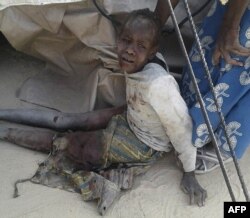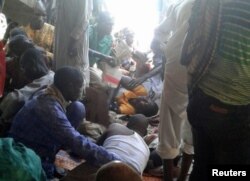The death toll from last week's bombing of civilian IDP camp in northeastern Nigeria has more than quadrupled from the originally reported 70 to 236 people. The Nigerian military says the bombing was an accident and is under investigation.
A team of six senior officers of the Nigerian Air Force has arrived in the northeastern Borno state to begin investigating how a military jet could drop two bombs on a camp for displaced civilians.
Nigerian Air Force spokesman Ayodele Famuyiwa told VOA the investigators will submit their findings no later than February 2. It is not clear whether the findings will be made public.
Human Right Watch Nigeria senior researcher Mausi Segun says she had hoped for a broader panel of investigators that included civil society.
“It should not be the Air Force alone, because indeed you cannot prosecute your own matter, should you? It goes against the principles of justice. And they’re not the only party involved,” Segun said.
In a surprising move, Nigeria's Air Force quickly confirmed the bombing and called it a mistake. Nigeria’s military routinely resists accusations of alleged abuses against civilians.
The bombing occurred a week ago in Rann, a small rural town where at least 20,000 people have sought refuge from Boko Haram. Teams from Doctors Without Borders were providing humanitarian assistance there when the bombing occurred.
‘An emergency within an existing emergency’
Doctors Without Borders Switzerland Director General Bruno Jochum told VOA the bombing exacerbated the situation on the ground.
“This attack has created an emergency within an existing emergency, and I think people have to understand it is a daily cycle of violence for populations caught between a movement like Boko Haram and a military counteroffensive,” Jochum said.
The seven year Boko Haram conflict has killed at least 20,000 people and displaced more than two million in the Lake Chad Basin.
Nine workers from the Nigerian Red Cross and the International Committee of the Red Cross were among the victims. Segun suggests this could be why the Air Force was so prompt in responding to the incident.
“If it were just ordinary local civilians, we might not have gotten an apology, a claim of responsibility, and a promise to investigate from the Nigerian government, if it ever came at all. Whether it was an accident or not, the right to life has been breached and the right of refugees to protection and safety has been breached,” Segun said.
Satellite imagery indicates the IDP settlements were clearly visible from the air, raising further questions.
Nigerian president Muhammadu Buhari called the bombing a “regrettable operational mistake.” But his claim that the conflict is in its “final stages” has been called into question. Among those critical of the claim is counterterrorism analyst Yan St. Pierre, who has been following Nigeria’s fight against Boko Haram for several years.
“If the Air Force is still involved in so-called mopping up operations, which is in itself problematic, that says they still require a heavy hand. They still require a lot of backup to use the Air Force. That means this conflict is anything but over and the situation is actually worse than they presented,” St. Pierre said.
Nigerian military officials declined to comment further until the investigation is finished.






